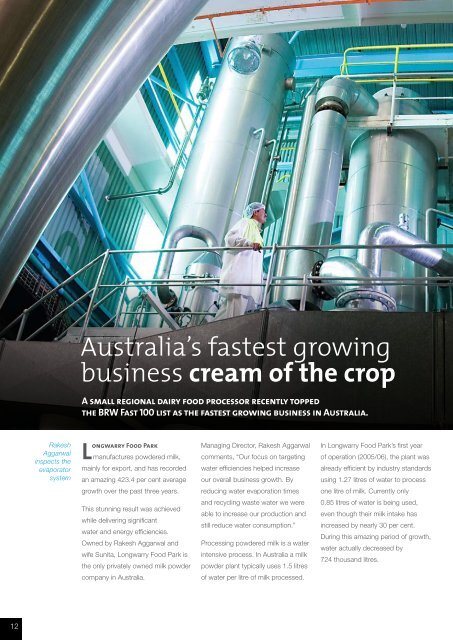Australia's fastest growing business cream of the crop - Longwarry ...
Australia's fastest growing business cream of the crop - Longwarry ...
Australia's fastest growing business cream of the crop - Longwarry ...
Create successful ePaper yourself
Turn your PDF publications into a flip-book with our unique Google optimized e-Paper software.
Australia’s <strong>fastest</strong> <strong>growing</strong><br />
<strong>business</strong> <strong>cream</strong> <strong>of</strong> <strong>the</strong> <strong>crop</strong><br />
A small regional dairy food processor recently topped<br />
<strong>the</strong> BRW Fast 100 list as <strong>the</strong> <strong>fastest</strong> <strong>growing</strong> <strong>business</strong> in Australia.<br />
Rakesh<br />
Aggarwal<br />
inspects <strong>the</strong><br />
evaporator<br />
system<br />
<strong>Longwarry</strong> Food Park<br />
manufactures powdered milk,<br />
mainly for export, and has recorded<br />
an amazing 423.4 per cent average<br />
Managing Director, Rakesh Aggarwal<br />
comments, “Our focus on targeting<br />
water efficiencies helped increase<br />
our overall <strong>business</strong> growth. By<br />
In <strong>Longwarry</strong> Food Park’s first year<br />
<strong>of</strong> operation (2005/06), <strong>the</strong> plant was<br />
already efficient by industry standards<br />
using 1.27 litres <strong>of</strong> water to process<br />
growth over <strong>the</strong> past three years.<br />
reducing water evaporation times<br />
one litre <strong>of</strong> milk. Currently only<br />
This stunning result was achieved<br />
while delivering significant<br />
water and energy efficiencies.<br />
Owned by Rakesh Aggarwal and<br />
wife Sunita, <strong>Longwarry</strong> Food Park is<br />
<strong>the</strong> only privately owned milk powder<br />
and recycling waste water we were<br />
able to increase our production and<br />
still reduce water consumption.”<br />
Processing powdered milk is a water<br />
intensive process. In Australia a milk<br />
powder plant typically uses 1.5 litres<br />
0.85 litres <strong>of</strong> water is being used,<br />
even though <strong>the</strong>ir milk intake has<br />
increased by nearly 30 per cent.<br />
During this amazing period <strong>of</strong> growth,<br />
water actually decreased by<br />
724 thousand litres.<br />
company in Australia.<br />
<strong>of</strong> water per litre <strong>of</strong> milk processed.<br />
12
“While our milk intake continues to<br />
increase, we are soon expecting to<br />
use just 0.75 litres <strong>of</strong> water per litre<br />
<strong>of</strong> milk processed. Although this is<br />
nearly half <strong>the</strong> industry average, we<br />
hope to fur<strong>the</strong>r reduce our water use<br />
ratio by implementing an innovative<br />
ozone based water treatment<br />
currently under trial which will enable<br />
greater reuse <strong>of</strong> water. This could<br />
see water consumption as low as<br />
0.5 litres <strong>of</strong> water used per litre <strong>of</strong><br />
milk produced.”<br />
reducing <strong>the</strong> evaporator washer<br />
time, <strong>the</strong> highest single water user<br />
at <strong>the</strong> plant.<br />
Traditionally, it takes four hours to<br />
clean an evaporator using a flow<br />
water rate equal to <strong>the</strong> milk flow rate.<br />
Previously at <strong>Longwarry</strong> Food Park<br />
<strong>the</strong> milk flow rate was 20,000 litres<br />
per hour, equating to 80,000 litres <strong>of</strong><br />
water used per day. With <strong>the</strong> help<br />
<strong>of</strong> a Business Water Grant from<br />
South East Water, <strong>the</strong> wash time<br />
was reduced to three hours, saving<br />
A fur<strong>the</strong>r<br />
2,000 litres <strong>of</strong><br />
water per day is<br />
saved from <strong>the</strong><br />
installation<br />
<strong>of</strong> automatic<br />
valves on <strong>the</strong><br />
evaporator<br />
vacuum pumps.<br />
Water eff iciencies<br />
= <strong>business</strong> benef its<br />
• Lower water costs per tonne<br />
<strong>of</strong> product produced<br />
• Less effluent produced<br />
• Increased <strong>business</strong><br />
productivity<br />
• Slashed energy costs by<br />
one third<br />
A water audit identified <strong>the</strong> potential<br />
20,000 litres <strong>of</strong> water per day or<br />
water efficiencies to be realised by<br />
six million litres per year.<br />
13



